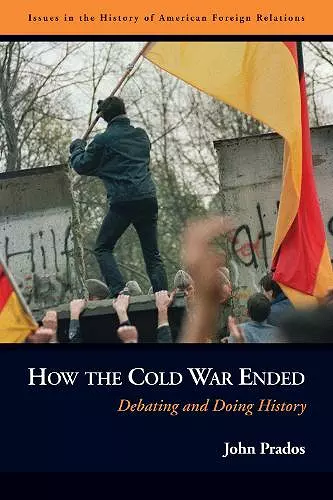How the Cold War Ended
Debating and Doing History
Format:Hardback
Publisher:Potomac Books Inc
Published:1st Dec '10
Currently unavailable, our supplier has not provided us a restock date

The Cold War continues to shape international relations almost twenty years after being acknowledged as the central event of the last half of the twentieth century. Interpretations of how it ended thus remain crucial to an accurate understanding of global events and foreign policy. The reasons for the Cold War’s conclusion, and the timing of its ending, are disputed to this day. In this concise introduction to the Cold War and its enduring legacy, John Prados recognizes the debate between those who argue the United States was the key player in bringing it to a close and those who maintain that American actions were secondary factors. Like a crime scene investigator meticulously dissecting evidence, he applies a succession of different methods of historical analysis to illuminate the key cataclysmic events of the 1980s and early 1990s from a range of perspectives. He also incorporates evidence from European and Soviet intelligence sources into the study. The result is a stunning narrative that redefines the era, embraces debate, and deconstructs history, providing a coherent explanation for the upheavals that ended the conflict. How the Cold War Ended also provides an in-depth guide to conducting historical inquiries: how to choose a subject, how to frame a narrative, and how to conduct research and draw conclusions. Prados does this for a variety of methods of historical analysis, furnishing a how-to guide for “doing history” even as it explores a crucial case study.
"For those who have read one of John Prados's past books, the quality of How the Cold War Ended will come as no surprise. It is expertly organized, exhaustively researched, and highly readable. Above all, it is a book which will challenge readers and invite them to conduct some extensive intellectual work. This is what makes it such a unique and valuable volume."—Rick Baillergeon, On Point
“A choice addition for any community and college library collection focusing on Cold War history.”—Midwest Book Review
“In a masterful and multifaceted rebuttal to the argument that Ronald Reagan's assertive stance won the Cold War, John Prados gives us a fuller picture of what happened. The collection of documents that he provides is fascinating and a great asset for teaching.”—Robert Jervis, Adlai E. Stevenson Professor of International Politics, Columbia University, and author of Why Intelligence Fails: Lessons from the Iranian Revolution and the Iraq War
“This book offers an invaluable window into the political and military dynamics at the end of the Cold War. Integrating a clear analysis of events with a deep investigation of personalities and policies, Prados explains how internal transformations in the Soviet Union and the United States changed the relations between these two antagonistic societies. Prados emphasizes the role of contingency and the importance of leadership in this process. He provides a superb example of serious historical analysis for contemporary events with continued relevance in our present world.”—Jeremi Suri, E. Gordon Fox Professor of History, University of Wisconsin, and author of Henry Kissinger and the American Century
“An indispensable primer on the myriad factors that contributed to the dénouement of the Cold War. Prados lays bare the historian's tools, giving every reader a chance to analyze the epic events of the period. This is an invaluable book for all those who are frustrated by the short-sighted triumphalism of post–Cold War America.”—Vladislav M. Zubok, professor of history, Temple University, and author of A Failed Empire: The Soviet Union in the Cold War from Stalin to Gorbachev
“The longer the debate over how the Cold War ended continues, the greater grow the intellectual stakes. By supplementing his careful analysis with judiciously selected documents, John Prados provides an essential foundation to engage the questions. He asks, he answers, he argues, and he challenges in a manner certain to provoke all readers to think harder.”—Richard H. Immerman, Edward J. Buthusiem Family, Distinguished Faculty Fellow in History, Marvin Wachman Director, Center for the Study of Force and Diplomacy, Temple University
“For a quarter-century no student of the Cold War has brought broader knowledge or keener insight to the subject of superpower relations than John Prados. His gifts are on display again in this volume, in which he examines the crucial questions of how and why the Cold War ended the way it did. Newcomers to the field will be informed and inspired, specialists challenged and provoked. This is a wonderful addition to a distinguished series.”—H. W. Brands, Dickson Allen Anderson Centennial Professor of History and Government, University of Texas at Austin and author of American Colossus
ISBN: 9781597971744
Dimensions: unknown
Weight: 594g
320 pages